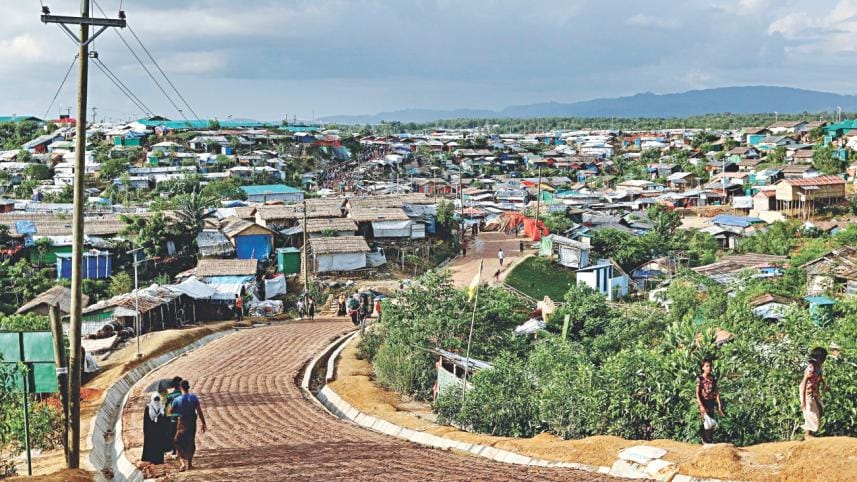Dhaka seeks strong global response to resolve Rohingya crisis

Foreign Minister Dr AK Abdul Momen today said Bangladesh will take a tougher position over Rohingya issue saying the global leadership must resolve it quickly to ensure greater peace and stability in the region.
"We tried our best, we worked as per your suggestions but finally it (repatriation) didn't happen. We'll make our position stronger," he said.
The foreign minister was talking to reporters after a discussion titled "15 August and Its Impact on Bangladesh" at Bangabandhu Memorial Trust auditorium organised by Awami League's international affairs sub-committee.
Dr Momen said Bangladesh gave Rohingyas the shelter on humanitarian ground but they are not Bangladesh's headache rather it is the headache of the entire world.
He said Myanmar "must be accommodative" and it must "convince" their nationals to go back to their place of origin in Rakhine state. "We did whatever we can from our part."
Bangladesh is now hosting over 1.1 million Rohingyas and most of them entered the country since August 25, 2017.
Despite all the preparations, no Rohingya turned up on Thursday to avail of the "voluntary" repatriation offer given to them to go back to their place of origin in Rakhine state of Myanmar prompting the authorities to suspend the repatriation process for the day.
"The world should be more concerned about it (Rohingya crisis)," he said urging the global leadership to find out a solution to the crisis that began on August 25, 2017.
The foreign minister also reminded that Asean countries have a responsibility to convince Myanmar to act and take back their nationals as quickly as possible.
He urged the UN agencies to focus more on Myanmar, instead of Bangladesh, to create conducive conditions there for safe return of Rohingyas and remove trust-deficit among them. "With our limited resources, we kept them well."
He said China, Russia, India, Japan and other countries are in favour of Bangladesh over Rohingya repatriation matter.
The UN cannot avoid the responsibility and mentioned that hatred has been there (Rakhine) for a long time, he added.
Bangladesh is always ready to facilitate the return of Rohingyas and mentioned that they are still hopeful, he further said.
The foreign minister said the process is still on but maintained that Myanmar could not create confidence among the Rohingyas.
On Thursday, Dr Momen said Bangladesh does not want to do anything by force and laid emphasis on removing trust-deficit among Rohingyas who refused to return to their homeland.
Dr Momen said there is a trust-deficit among Rohingyas and reiterated Bangladesh's call to take 100 "majhis" or Rohingya leaders to Rakhine state, and show them what measures and arrangements are taken to welcome Rohingyas to their own homes as they fear about their safety and security.
The foreign minister earlier said he is thinking about forming a commission with people from various countries to go and see the development in Rakhine and inspect whether peace and stability are prevailing there or not with required steps.
"Myanmar should prove that development is there and peace is prevailing," he said adding that Myanmar can also take journalists there to see the situation on the ground.
Dr Momen said Myanmar should come forward if they remain honest and should give access to Rakhine to see the situation there.
He indicated about slower fund flow -- both from locally and internationally -- which might create problems for the Rohingyas though they are living a comfortable life now. "For their own better future, they should go back."
The minister said their efforts will continue for voluntary and safe return of Rogingyas to their place of origin.
The two countries signed a repatriation deal on November 23, 2017, but there has been little progress.
On July 29, Bangladesh handed a fresh list of 25,000 Rohingyas from around 6,000 families to Myanmar for verification before their repatriation to Rakhine state.
With the latest list, Bangladesh has so far handed the names of around 55,000 Rohingyas to the Myanmar authorities and around 8,000 of them have been verified. Myanmar only cleared 3,450 Rohingyas for beginning the repatriation.
On January 16, 2018 Bangladesh and Myanmar inked a document on "Physical Arrangement", which was supposed to facilitate the return of Rohingyas to their homeland.
The "Physical Arrangement" stipulate s that the repatriation will be completed preferably within two years from the start.
The first batch of Rohingyas was scheduled to return on November 15 last year but it was halted amid the unwillingness of Rohingyas to go back for lack of a congenial environment in Rakhine.



 For all latest news, follow The Daily Star's Google News channel.
For all latest news, follow The Daily Star's Google News channel.
Comments